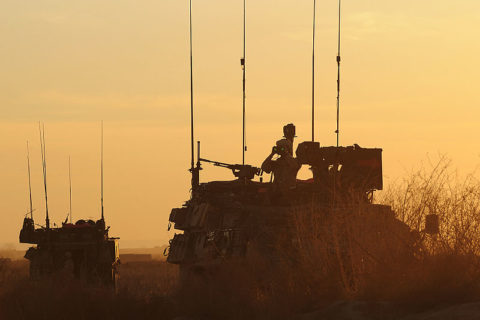In The Line a Canadian veteran of Afghanistan (writing as “Tommy Conway”) explains why Canada’s “nice guy” illusions have made us weaker and unable to succeed at so many of our endeavours:

Canadian Army LAV III convoy near Khadan, Afghanistan, 2010-01-25.
Photo by Staff Sgt. Christine Jones via Wikimedia Commons.
We do not merely have an institutional problem, but a spiritual one. The peoples of the Western democracies have lost their sense of shame. Canadians, in particular, have lost our collective self-respect. We have become “nice guys”, the sort of people who expect to be praised because we can do no harm. We have ceased to be a citizenry that values honour — the kind of people who are capable of doing hard things, and willing to spend a lot of effort doing the right ones.
During the Afghan war, many NATO soldiers lived in very harsh conditions “outside the wire”. In forward patrol bases or on extended missions, water was at a premium, so washing socks was a weekly treat. But for others, Afghanistan meant a lot of time generating PowerPoint decks in bloated headquarters. Go past the walls in Kabul which separated the safe NATO bases from the bustling city, and one could find cafes staffed by friendly Nepalese baristas, air-conditioned gyms, and plentiful cold drinks.
Absurdly, in the American compound at the same Kabul International Airport where desperate evacuees tramped through trenches of human waste and barbed wire to escape the country as the Taliban advanced, the U.S. Air Force maintained a pleasant compound with green grass. Kandahar International Airport was well-known for a much-frequented strip of fast-food outlets, including a Tim Hortons.
These amenities warped the perspective of those with regular access to them. Canadian Army lore is full of tales of confrontations between bedraggled, unshaven troops coming in from patrol being denied access to an iced capp for improper dress. I’ve rarely been so embarrassed as the time I took tea from an Afghan father of three, smiling in the sweltering heat of an Afghan summer, only to return to my relatively comfortable quarters behind safe walls to hear people bitch and moan about the fridge being out of their favourite pop.
It wasn’t just individual troops who lost perspective. Senior leaders made a big deal about receiving two beers on Canada Day, and put extensive measures in place to conceal the festivities from Afghan staff because the presence of alcohol might offend cultural sensibilities. I am not a cultural expert, but I imagine the locals were offended about the well-watered, visibly overfed, air-conditioned people in less than a kilometer from the poverty of the population they were supposed to be protecting. Some of the old-timers, who had served with the Communist army, stated categorically that they liked the Russians more because they shared their vodka — and their hardships.
We barely had perspective then, and we sure as hell don’t now.
Predictably, the further from the theatre of operations, the more that perspective was distorted. Somehow, the Canadian public grew “war-weary” over Afghanistan, though it’s difficult to understand what tired them. Between 1939-45, this country sustained a full field army, despite drawing from a population a third of today’s size. Canadians withstood rationing as tens of thousands of their countrymen died overseas, and came out of the war optimistic about the future.
[…]
Compare that to what we suffered in Afghanistan; we sustained a strong battalion group, and maintained a few bloated headquarters — all of this proved to be too much to keep up. Canada slid into a training mission in 2011 and then gave up completely in 2014. During the fighting, the vast majority of the population felt no impact whatsoever. As Tom Nichols paraphrased a U.S. officer in Iraq, “We’re at war, America’s at the mall.” Canada was there with them, complaining about the lines in the food court.



